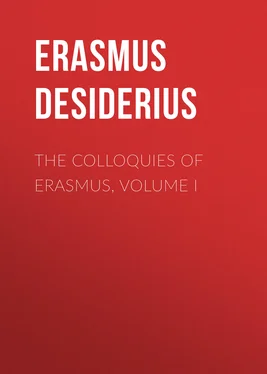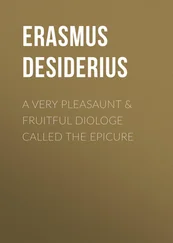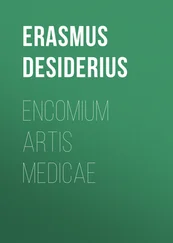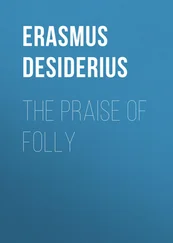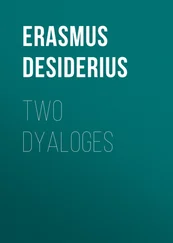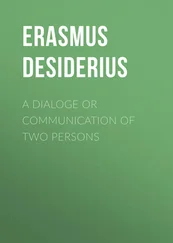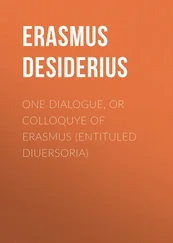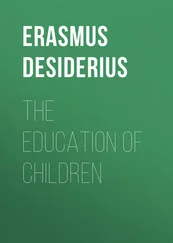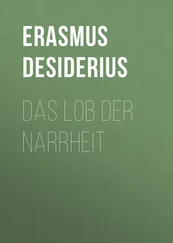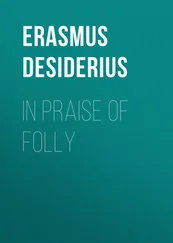Desiderius Erasmus - The Colloquies of Erasmus, Volume I
Здесь есть возможность читать онлайн «Desiderius Erasmus - The Colloquies of Erasmus, Volume I» — ознакомительный отрывок электронной книги совершенно бесплатно, а после прочтения отрывка купить полную версию. В некоторых случаях можно слушать аудио, скачать через торрент в формате fb2 и присутствует краткое содержание. Жанр: foreign_prose, foreign_antique, на английском языке. Описание произведения, (предисловие) а так же отзывы посетителей доступны на портале библиотеки ЛибКат.
- Название:The Colloquies of Erasmus, Volume I
- Автор:
- Жанр:
- Год:неизвестен
- ISBN:нет данных
- Рейтинг книги:5 / 5. Голосов: 1
-
Избранное:Добавить в избранное
- Отзывы:
-
Ваша оценка:
- 100
- 1
- 2
- 3
- 4
- 5
The Colloquies of Erasmus, Volume I: краткое содержание, описание и аннотация
Предлагаем к чтению аннотацию, описание, краткое содержание или предисловие (зависит от того, что написал сам автор книги «The Colloquies of Erasmus, Volume I»). Если вы не нашли необходимую информацию о книге — напишите в комментариях, мы постараемся отыскать её.
The Colloquies of Erasmus, Volume I — читать онлайн ознакомительный отрывок
Ниже представлен текст книги, разбитый по страницам. Система сохранения места последней прочитанной страницы, позволяет с удобством читать онлайн бесплатно книгу «The Colloquies of Erasmus, Volume I», без необходимости каждый раз заново искать на чём Вы остановились. Поставьте закладку, и сможете в любой момент перейти на страницу, на которой закончили чтение.
Интервал:
Закладка:
After this he visited England , going along with a young Gentleman, to whom he was Tutor, who, as he says himself, was rather his Friend than his Patron. In England he was received with universal Respect; and, as he tells us himself in his Life, he won the Affections of all good Men in our Island. During his Residence here, he was intimately acquainted with Sir Thomas More , William Warham , Archbishop of Canterbury , John Colet , Dean of St. Pauls , the Founder of St. Paul's School , a Man remarkable for the Regularity of his Life, great Learning and Magnificence; with Hugh Latimer Bishop of Winchester , Linacre , Grocinus , and many other honourable and learned Persons, and passed some Years at Cambridge , and is said to have taught there; but whether this was after his first or second Time of visiting England , I do not determine: However, not meeting with the Preferment he expected, he went away hence to make a Journey to Italy , in the Company of the Sons of Baptista Boetius , a Genoese , Royal Professor of Physick in England ; which Country, at that Time, could boast of a Set of learned Men, not much inferior to the Augustan Age: But as he was going to France , it was his ill Fortune, at Dover , to be stripp'd of all he had; this he seems to hint at in his Colloquy , intitled, the Religious Pilgrimage : But yet he was so far from revenging the Injury, by reflecting upon the Nation, that he immediately published a Book in Praise of the King and Country; which Piece of Generosity gained him no small Respect in England . And it appears by several of his Epistles, that he honoured England next to the Place of his Nativity.
It appears by Epist. 10. Lib. 16 . that when he was in England Learning flourished very much here, in that he writes, Apud Anglos triumphant bonæ Literæ recta Studia ; and in Epist. 12. Lib. 16 . he makes no Scruple to equal it to Italy itself; and Epist. 26. Lib. 6. commends the English Nobility for their great Application to all useful Learning, and entertaining themselves at Table with learned Discourses, when the Table-Talk of Churchmen was nothing but Ribaldry and Profaneness. In Epist . 10. Lib . 5, which he addresses to Andrelinus , he invites him to come into England , recommending it as worth his While, were it upon no other Account, than to see the charming Beauties with which this Island abounded; and in a very pleasant Manner describes to him the Complaisance and innocent Freedom of the English Ladies, telling him, that when he came into a Gentleman's House he was allowed to salute the Ladies, and also to do the same at taking Leave: And tho' he seems to talk very feelingly on the Subject, yet makes no Reflections upon the Virtue of English Women. But to return to him; as to his Voyage to Italy , he prosecuted his Journey to Turin , and took the Degree of Doctor of Divinity in that University; he dwelt a whole year in Bolognia , and there obtain'd a Dispensation from Pope Julian to put off his Canon's Habit, but upon Condition not to put off the Habit of Priest; and after that went to Venice , where was the Printing-House of the famous Manutius Aldus , and there he published his Book of Adagies , and staying some Time there, wrote several Treatises, and had the Conversation of many eminent and learned Men. From thence he went to Padua , where at that Time Alexander the Son of James King of Scotland , and Bishop of St. Andrews in Scotland , studied, who chose Erasmus for his Tutor in Rhetorick, and went to Seana , and thence to Rome , where his great Merits had made his Presence expected long before. At Rome he gained the Friendship and Esteem of the most considerable Persons in the City, was offered the Dignity of a Penitentiary, if he would have remained there: But he returned back to the Archbishop, and not long after went with him again to Italy , and travelling farther into the Country, went to Cuma , and visited the Cave of Sybilla . After the Death of the Archbishop he began to think of returning to his own Country, and coming over the Rhetian Alps , went to Argentorat , and thence by the Way of the Rhine into Holland , having in his Way visited his Friends at Antwerp and Louvain ; but Henry VIII. coming to the Crown of England, his Friends here, with many Invitations and great Promises, prevailed upon him to come over to England again, where it was his Purpose to have settled for the remaining Part of his Life, had he found Things according to the Expectation they had given him: But how it came about is uncertain, whether Erasmus was wanting in making his Court aright to Cardinal Wolsey , who at that Time manag'd all Things at his Pleasure; or, whether it were that the Cardinal look'd with a jealous Eye upon him, because of his intimate Friendship with William Warham , Archbishop of Canterbury , who had taken him into his Favour, between whom and Wolsey there was continual Clashing, (the Cardinal after he had been made the Pope's Legate, pretending a Power in the Archbishoprick of Canterbury .) On this Disappointment he left England , and went to Flanders ; Archbishop Warham had indeed shewed his Esteem for him, in giving him the Living of Aldington . In short, Erasmus takes Notice of the Friendship between himself and Warham in the Colloquy called, The Religious Pilgrimage .
As to his Familiarity with Sir Thomas More , there are several Stories related, and especially one concerning the Disputes that had been between them about Transubstantiation , or the real Presence of Christ in the consecrated Wafer, of which Sir Thomas was a strenuous Maintainer, and Erasmus an Opponent; of which, when Erasmus saw he was too strongly byassed to be convinced by Arguments, he at last made use of the following facetious Retortion on him. It seems in their Disputes concerning the real Presence of Christ in the Sacrament, which were in Latin , Sir Thomas had frequently used this Expression, and laid the Stress of his Proof upon the Force of Believing, Crede quod edis et edis , i.e. Believe you eat [Christ] and you do eat him; therefore Erasmus answers him, Crede quod habes et habes, Believe that you have [ your Horse ] and you have him . It seems, at Erasmus's going away, Sir Thomas had lent him his Horse to carry him to the Sea-side or Dover ; but he either carried him with him over Sea to Holland , or sent him not back to Sir Thomas , at least for some Time; upon which Sir Thomas writing to Erasmus about his Horse, Erasmus is said to have written back to him as follows.
Ut mihi scripsisti de corpore Christi,
Crede quod edis et edis.
Sic tibi rescribo de tuo Palfrido;
Crede quod habes et habes.
Being arriv'd at Flanders by the Interest of Sylvagius Chancellor to Charles of Austria , afterwards Emperor of Germany , known by the name of Charles V: he was made one of his Counsellors.
In the mean Time Johannes Frobenius , a famous Printer, having printed many of his Works at Basil in Switzerland , and being much taken with the Elegancy of his Printing, and the Neatness of his Edition, he went thither, pretending that he undertook that Journey for the Performance of some Vow he had made; he was kindly entertain'd by him, and publish'd several Books there, and dedicated this his Book of Colloquies to Frobenius's Son, and resided till the Mass had been put down there by the Reformers. When he left that Place, he retir'd to Friburg in Alsace . Before his going to Friburg , he visited the low Countries to settle certain Affairs there. And was at Cologn at the Time that the Assembly was at Worms , which being dissolv'd, he went again to Basil , either, as some say, for the Recovery of his Health, or, as others, for the publishing of several Books. He receiv'd the Bounty and Munificence of several Kings, Princes, and Popes, and was honourably entertain'd by many of the chief Cities which he pass'd through. And by his Procurement, a College of three Languages was instituted at Louvain , at the Charge of Hieronimus Buslidius , Governour of Aria , out of certain Monies he at his Death bequeath'd to the use of studious and learned Men. An Account of which coming to the Ears of Francis King of France , he invited him by Letters to Paris , in order, by his Advice to erect the like College there. But certain Affairs happening, his Journey thither was hindred. He went to Friburg in Alsace , where he bought him an House, and liv'd seven Years in great Esteem and Reputation, both with the chief Magistrates and Citizens of the Place, and all Persons of any Note in the University. But his Distemper, which was the Gout, coming rudely upon him, he, thinking the Change of Air would afford him Relief, sold his House, and went again to Basil , to the House of Frobenius ; but he had not been there above nine Months before his Gout violently assaulted him, and his strength having gradually decay'd, he was seized with a Dysentery, under which having laboured for a Month, it at last overcame him, and he died at the House of Jerome Frobenius , the son of John the famous Printer, the 12th of July 1536, about Midnight, being about seventy Years of Age: After his last retreat to Basil , he went seldom abroad; and for some of the last Months stirred not out of his Chamber. He retained a sound Mind, even to the last Moments of his Life; and, as a certain Author saith, bid Farewell to the World, and passed into the State of another Life, after the Manner of a Protestant, without the Papistical Ceremonies of Rosaries, Crosses, Confession, Absolution, or receiving the transubstantiated Wafer, and in one Word, not desiring to have any of the Romish Superstitions administered, but according to the true Tenor of the Gospel, taking Sanctuary in nothing but the Mercies of God in Christ. And finding himself near Death, he gave many Testimonies of Piety and Christian Hope in God's Mercy, and oftentimes cry'd out in the German Language, Liever Godt , i.e. dear God; often repeating, O Jesus have Mercy on me! O Lord, deliver me! Lord, put an End to my Misery! Lord, have Mercy upon me.
Читать дальшеИнтервал:
Закладка:
Похожие книги на «The Colloquies of Erasmus, Volume I»
Представляем Вашему вниманию похожие книги на «The Colloquies of Erasmus, Volume I» списком для выбора. Мы отобрали схожую по названию и смыслу литературу в надежде предоставить читателям больше вариантов отыскать новые, интересные, ещё непрочитанные произведения.
Обсуждение, отзывы о книге «The Colloquies of Erasmus, Volume I» и просто собственные мнения читателей. Оставьте ваши комментарии, напишите, что Вы думаете о произведении, его смысле или главных героях. Укажите что конкретно понравилось, а что нет, и почему Вы так считаете.
